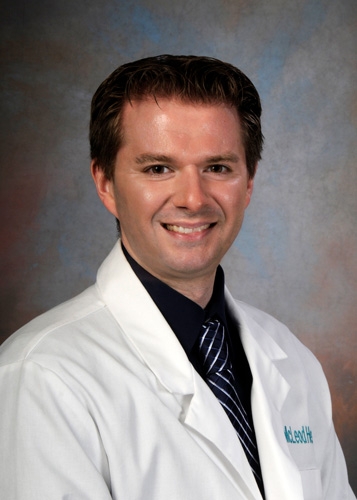Detect Heart Disease Early

Dr. Ryan Garbalosa, McLeod Cardiologist
McLeod Cardiology Associates
Heart disease is the leading cause of death in the United States. Half of the people who have heart attacks will not have any symptoms prior to their heart attack, according to the Centers for Disease Control and Prevention.
A heart attack occurs when the flow of blood is cut off by plaque and a blood clot that has formed in the coronary arteries, the arteries that give blood to the heart. Plaque, the build-up of cholesterol and calcium, can cause hardening of these arteries, which narrows the arteries causing a decrease of blood flow. Coronary artery disease (CAD) occurs when the coronary arteries that supply blood to the heart become hardened and narrow prohibiting blood flow.
To help detect heart disease in its early stages, McLeod offers Coronary Calcium Scoring, a heart attack prevention screening program. Coronary calcium scoring is a non-invasive method of determining the presence of coronary artery disease in someone without symptoms, but who is at an increased risk for coronary artery disease. It is a very quick, painless test that only takes about five minutes. The calcium score is obtained from a CT scan. The score indicates the amount of calcium in the arteries around the heart. After the study, the score numbers are calculated and reported to your doctor.
The screening test is best for people who are at an intermediate risk for heart disease. Candidates for Coronary Calcium Scoring:
- Men over 45 years of age with one additional risk factor
- Women over 55 years of age with one additional risk factor
Risk Factors include:
- Family history of heart disease
- Smoking
- High Blood Pressure
- High Cholesterol
- Diabetes
- Obesity
- Sedentary Lifestyle
Calcium scores are reported based upon the amount of calcium build up around the heart. Zero is the lowest number and that generally indicates there is no calcium build up. If the score is more than 400, a fairly high number, it may indicate the need for further non-invasive testing like a stress test. If the score is between 0 and 400, these are lower levels but still indicate the presence of disease and the need for aggressive risk factor modification.
Benefits of the coronary calcium scoring test include: detection of coronary artery disease at an early stage when there are no symptoms; a determination of future risk of coronary artery disease; prevention of a fatal heart attack; and discussion of a treatment plan if coronary artery blockages are present. Although the test will not tell us the severity of a blockage, it does indicate that there may be some blockages present.
The information provided by the test can be very useful in alerting people to modify their risk factors for preventing heart disease and to help guide doctors and patients in their treatment approach. Modification of risk factors is key. When a person is aware they have heart disease, most will tend to be more aggressive about their health and adjusting their lifestyle or medication.
Risk Factors for Coronary Artery Disease:
Factors You Can Control
- Smoking
- High Cholesterol
- High Blood Pressure
- Diabetes
- Obesity
- Physical Inactivity
Factors You Cannot Control
- Family History
- Father (before age 55)
- Mother (before age 65)
- Brother
- Sister
- Sex, Race, Age
Through early detection, we are able to help patients modify their risk factors, receive earlier treatment and prevent the disease from worsening or becoming a life-threatening event. McLeod offers the Coronary Calcium Score screening at a low cost of $150 dollars. Unfortunately, screening programs are generally not covered by insurance. A physician referral is required. Talk with your doctor or primary care provider to determine if coronary calcium scoring is a screening test for you.
Coronary Calcium Screenings are available at:
- McLeod Health Clarendon
- McLeod Regional Medical Center
- McLeod Health Dillon
- McLeod Health Loris
- McLeod Health Seacoast
The physicians of McLeod Cardiology Associates can help you manage your heart-related conditions. Cardiologists Dr. Ryan Garbalosa and Dr. Dennis Lang, and Electrophysiologist Dr. Prabal Guha care for patients on the campus of McLeod Health Clarendon and at their office located at 540 Physicians Lane in Sumter. Appointments can be made by calling 803-883-5171.
-
McLEOD REGIONAL MEDICAL CENTER FLORENCE
843-777-2000 -
McLEOD DARLINGTON
843-777-1100 -
McLEOD DILLON
843-774-4111 -
McLEOD LORIS
843-716-7000 -
McLEOD SEACOAST
843-390-8100 -
McLEOD CHERAW
843-537-7881 -
McLEOD CLARENDON
803-433-3000



-
McLEOD REGIONAL MEDICAL CENTER FLORENCE
843-777-2000 -
McLEOD DARLINGTON
843-777-1100 -
McLEOD DILLON
843-774-4111 -
McLEOD LORIS
843-716-7000 -
McLEOD SEACOAST
843-390-8100 -
McLEOD CHERAW
843-537-7881 -
McLEOD CLARENDON
803-433-3000
 Find a Doctor
Find a Doctor  Locations
Locations  Services
Services